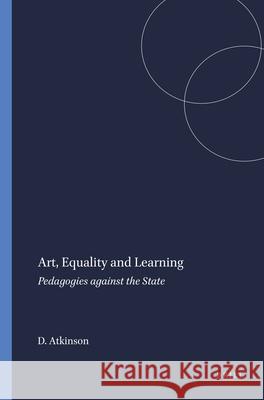Art, Equality and Learning » książka
Art, Equality and Learning
ISBN-13: 9789460914539 / Angielski / Twarda / 2011 / 194 str.
Art, Equality and Learning
ISBN-13: 9789460914539 / Angielski / Twarda / 2011 / 194 str.
(netto: 428,79 VAT: 5%)
Najniższa cena z 30 dni: 423,64
ok. 30 dni roboczych.
Darmowa dostawa!
In this book the notions of real learning and equality are approached as processes of becoming leading to the figuration of new worlds through local curations of learning and practice. Though its main theses are mainly grounded in the context of art practice and education they have a much wider application to other (perhaps all) contexts of learning through the notions of pedagogies against the state and pedagogies of the event. Learning is conceived as a political act rather than, for example, an incremental process of psychological or sociological development. Most chapters of the book deal with a series of tensions between tradition and the new; between art in education and contemporary art; between ontologies of practice and epistemologies of assessment; between socio-cultural notions of difference and an egalitarian notion of the Same, between an ethics of reality, of established values, principles and practices and an ethics of the real; between the different ontological domains of the artist and the teacher which are brought together in the constituency of the artist-teacher, between knowledge and not-knowing, between know-ledge and truth. The intention is not to resolve such tensions as such attempted resolution will always be incomplete, rather they are discussed in the spirit of an imperative to decide what kind of future we want for pedagogical spaces of teaching and learning. The text draws upon key ideas from the philosophical work of Alain Badiou, Judith Butler, Jacques Ranciere, Slavoj Zizek, Jacques Lacan and others and these are applied to pedagogical spaces in order to initiate a debate about teaching and learning. The book raises some important questions relating to subjectification, ethics, multiculturalism and the struggles inherent to the tensionalities of becoming an artist-teacher. "Dennis Atkinson has written an important and compelling book to revision the teaching of art for the 21st century in our schools. This an absolute must read for art educators who continue to strive to make a transformative difference in public education. It is a remarkable achievement in foresight and leadership. Atkinson raises the most difficult questions concerning subjectification, ethics, multiculturalism, assessment and the tensions and benefits of becoming an artist educator. He draws on the leading edge of contemporary cultural and artistic theory focusing on the writings of Butler, Lacan Badiou, Ranciere as well as Bourriaud, Deleuze and Guattari." jan jagodzinski"
In this book the notions of real learning and equality are approached as processes of becoming leading to the figuration of new worlds through local curations of learning and practice. Though its main theses are mainly grounded in the context of art practice and education they have a much wider application to other (perhaps all) contexts of learning through the notions of pedagogies against the state and pedagogies of the event. Learning is conceived as a political act rather than, for example, an incremental process of psychological or sociological development. Most chapters of the book deal with a series of tensions between tradition and the new; between art in education and contemporary art; between ontologies of practice and epistemologies of assessment; between socio-cultural notions of difference and an egalitarian notion of the Same, between an ethics of reality, of established values, principles and practices and an ethics of the real; between the different ontological domains of the artist and the teacher which are brought together in the constituency of the artist-teacher, between knowledge and not-knowing, between know¬ledge and truth.The intention is not to resolve such tensions as such attempted resolution will always be incomplete, rather they are discussed in the spirit of an imperative to decide what kind of future we want for pedagogical spaces of teaching and learning. The text draws upon key ideas from the philosophical work of Alain Badiou, Judith Butler, Jacques Ranciere, Slavoj Zizek , Jacques Lacan and others and these are applied to pedagogical spaces in order to initiate a debate about teaching and learning. The book raises some important questions relating to subjectification, ethics, multiculturalism and the struggles inherent to the tensionalities of becoming an artist-teacher."Dennis Atkinson has written an important and compelling book to revision the teaching of art for the 21st century in our schools. This an absolute must read for art educators who continue to strive to make a transformative difference in public education. It is a remarkable achievement in foresight and leadership. Atkinson raises the most difficult questions concerning subjectification, ethics, multiculturalism, assessment and the tensions and benefits of becoming an artist educator.He draws on the leading edge of contemporary cultural and artistic theory focusing on the writings of Butler, Lacan Badiou, Ranciere as well as Bourriaud,Deleuze and Guattari." jan jagodzinski











